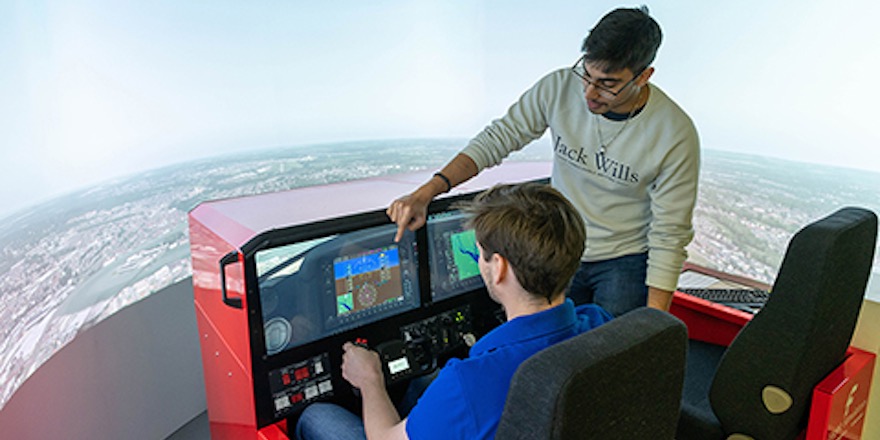University of Southampton Unveils High Tech Flight Simulator
Students at the University of Southampton gain valuable experience applying learning to flight simulator.

A state-of-the-art flight simulator to train the aeroplane engineers of the future has been officially opened at the University of Southampton.
Providing students with a realistic experience of flight
The simulator seats a pilot and an instructor, and has 180-degree surround screens. It can be programmed to simulate different aircraft, from single-seaters to jumbo jets — and each can be tailored to have specific characteristics, such as different shaped wings or a different sized engine. The ‘pilot’ can choose the terrain to fly over, the conditions to fly in, and the airports for take-off and landing.
The University of Southampton has one of the longest heritages for flight simulation technology, having used it as part of its teaching for more than 20 years.
Professor Simon Cox, Head of the Department of Aeronautics and Astronautics, said: “It’s important we give our students realistic experiences of flight, to inspire them and to bring to life what they are learning, giving them a full understanding of the physics of different craft in flight. Students learn how different designs of planes influence their performance, from how quickly they take off, to their manoeuvrability, to how they land. They can experience all these things using the simulator.”
The new simulator is one of six Boeing-funded simulators at the university used for teaching engineering undergraduates. Three other simulators are on motion platforms, with one linked to a virtual reality headset for an immersive experience. There are also two desktop simulators.
Dr. Andrea Da Ronch, Associate Professor of Engineering, added: “Unique to Southampton is that we have a set of simulators with different fidelities. For the beginner there is a simple desktop simulator, which is essential to learn how the controls and the system work. With experience, our students progress onto the more advanced simulators.”
Valuable application of maths associated with flight for undergrad students
PhD student Nicolas Wahler, 27, who holds a pilot licence, said: “The simulator brings valuable insight for undergraduates in terms of how the maths behind the aeroplane works in practice. It’s invaluable for students to have practical experience of what they are learning in theory.”
Fellow PhD student Declan Clifford, 25, added: “The simulator is valuable for learning about the maths associated with flight — students can apply their mathematical calculations to the simulator to find out what they actually do — in a very safe environment.”
The flight simulators are funded by Boeing, which has strategic partnerships with six universities across the UK. Ian McNeil, Director of Engineering at Boeing Defence UK, who is also an Electrical Engineering graduate from the University of Southampton, said: “Boeing is committed to building the skills and expertise needed to grow the aviation industry. We are delighted to support the launch of this flight simulator, which will enhance the curriculum by taking theoretical learning into practical, simulated application. Importantly, it will also be used by the university for STEM outreach, to encourage more potential engineers to pursue future careers in aerospace.”
Learn more about the University of Southampton